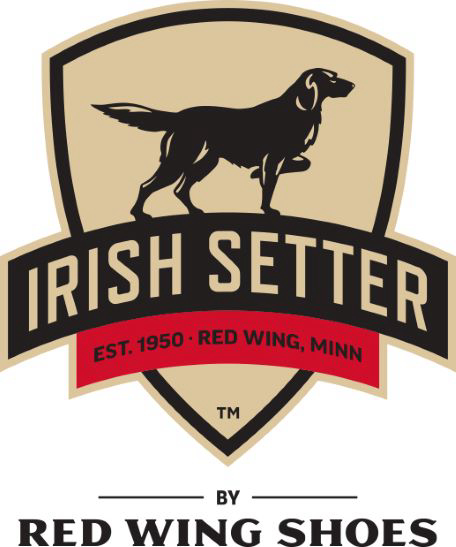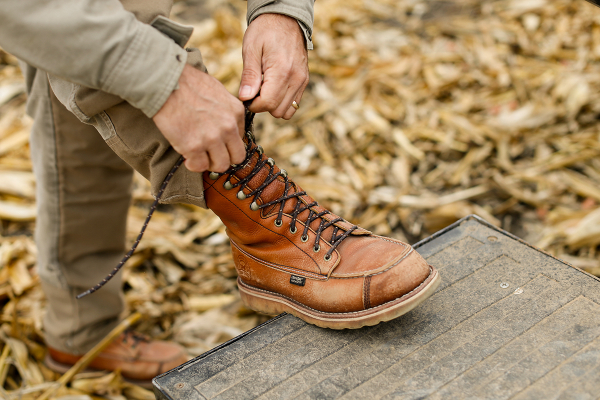  |
The official upland bird hunting boot of Pheasants Forever and Quail Forever, Irish Setter, and its iconic Wingshooter boot, have been revered by hunters for nearly 70 years.
In 1950, the Red Wing Shoe Company in Red Wing, Minnesota introduced a 9-inch lace-up leather boot for sportsmen – upland bird and other hunters who spent autumn days in the woods and fields of North America.
The boot, style 854, was made with leather tanned using extracts from the bark of sequoia trees, which gave it a distinctive deep reddish-orange color known as “Oro Russet.” It was so similar in color to the coat of Irish Setter dogs that it was named “Irish Setter” in the company’s 1950 catalog.
The roots of Irish Setter boots actually go back much farther. In the 1920s, the Red Wing Shoe Company introduced “Outing Boots” -- strapping 18-in. high boots that were the first styles specifically designed for hunters. In the mid-1930s, Red Wing started to develop its first upland boots.
Wingshooter boots were originally developed with the legendary white crepe sole for some very practical reasons, for very practical people. The shallow lug sole was designed to shed mud and debris, so the boot served a dual-purpose for farmers who wore it in their barns and pastures and also used it for upland bird hunting.
In 1952, Irish Setter hunting boots continued to evolve. Retaining the distinctive moc toe of style 854, a new 8-inch boot, style 877, replaced its predecessor’s heel with a wedge sole made of white crepe rubber that promised to be quiet underfoot in the woods. This sole had been used on shoes before, but the 877 was the first use of it in a tall hunting boot.
In addition to being used by stalking hunters who needed boots that could go all day in rough terrain, the 877 soon found its way to American job sites, as hunters began wearing their hunting boots to build homes, maintain industrial plants, and drive 18-wheelers.
Irish Setter boots changed little throughout the 1960s. A 6-inch version and a few other colors were added, along with some subtle boot construction methods. Otherwise, the boot remained the same as the pair that was ceremonially presented to President Eisenhower in 1960.
By the 1990s, the original 877 became known as the “classic Red Wing work boot,” while Irish Setter expanded into an entire family of hunting boots.
Supporting Upland Hunters
Irish Setter hunting boots have been a favorite of upland bird hunters since the 1950s, almost from the moment they were introduced.
For example, in 1957 the company made a public service film featuring pheasant hunting. And from the 1950s through the ‘70s, it ran an annual contest for the longest pheasant tail – with winners receiving a free pair of boots. The cover of the 1966 catalog even featured an illustration of a bobwhite quail – a nod to the popularity of Irish Setter boots for upland bird hunting.
In the early 1990s, the company promoted styles 809 and 862 for upland bird hunting. These boots were popular giveaways at local-chapter Pheasants Forever fundraising banquets, and at the conventions of other fishing and hunting organizations. The 809 was an all-purpose field boot for hunting or hiking through cold, wet, upland terrain. The nine-inch boot featured a Gore-Tex® bootie and Thinsulate® insulation to keep feet dry and warm.
During this time, Irish Setter also partnered with Jon Kruger, NSCA World Sporting
Clays Champion, to design oxford and chukka-style boots specifically for those who enjoyed shooting sporting clays. By the late 1990s the Irish Setter brand had grown to more than 20 styles within five product families.
In September 1998, Sports Afield, one of the most widely read national outdoor magazines of the day, named the Irish Setter boot style 822, called the “Prairie Falcon,” as its Editor’s Choice. The Winter 1999 edition of The Legend, a newsletter for retailers published by Irish Setter, featured the following comment from Jerry Eckstrom, then Irish Setter VP and GM, about style 844:
“This is a traditional looking hunting boot that customers can spot 50 feet away and immediately identify as an Irish Setter. It pulls them in. Then, when they try it on, they know from the fit, feel, materials and construction that this is a boot made to last.”
Irish Setter’s connection to upland bird hunting continued into the new century when Pheasants Forever named Irish Setter as its official hunting boot brand in 2001.
Introduction of the Wingshooter
In 2003, Irish Setter introduced the Wingshooter family – six new boots specifically designed for upland hunters walking long distances in search of pheasants, quail, ruffed grouse and other upland birds.
The anchor of the Wingshooter family in 2003 was style 854, designed for the modern hunter and featuring kangaroo leather in a nine-inch boot along with many other features. The family also included an oxford, a chukka and 9- and 17-inch tall lace-up boots, some with 400 grams of Thinsulate® Ultra insulation. Since then, the Wingshooter family has seen the addition of different heights (7-inch and 9-inch versions) and different types of leathers in a variety of colors, all with new features upland hunters appreciate.
Today, the Wingshooter hunting boot family includes 10 waterproof styles and an insulated option, all made with premium full-grain leather, durable Goodyear welt construction and the classic prairie sole to ensure comfort and stability during long hunting days.
Wingshooter ST Work Boots
For many years, upland hunters who loved their Wingshooter boots also wore them for work. So in 2017, Irish Setter introduced the Wingshooter ST (Safety Toe).
“Wingshooter boots became synonymous with go-all-day comfort,” says Charley Bryant, Irish Setter Product Merchant. “We noticed that residential carpenters, electricians, plumbers and other workers were wearing Wingshooters on the job. So we added 6- and 8-inch versions with non-metallic safety toes that meet ASTM requirements to make Wingshooter ST boots work-ready.”
Irish Setter Boots and Habitat Conservation
Irish Setter Wingshooter hunting boots have a legendary reputation as “the boots” for serious upland bird hunters. That reputation was cemented in 2015 when Irish Setter became the “Official Upland Hunting Boot” of Pheasants Forever and Quail Forever, the nation's largest nonprofit organization dedicated to upland habitat conservation.
Pheasants Forever and Quail Forever have more than 140,000 members and 760 local chapters across the United States and Canada. Since its creation in 1982, Pheasants Forever has spent $867 million on 540,000 habitat projects benefiting 18.1 million acres nationwide.
While Irish Setter has been closely associated with Pheasants Forever for many years, the designation creates a clear connection between the Irish Setter brand and the conservation of wildlife.
“The partnership with Irish Setter is one of those perfect scenarios when a product our members and employees love to wear in the field is also a company that helps us create more habitat in those fields,” said Chris Kalis, director of corporate partnerships for Pheasants Forever and Quail Forever. “We’re thrilled to have Irish Setter on board for another year of important conservation work together.”
“We know outdoor enthusiasts value the incredible habitat conservation work that Pheasants Forever and Quail Forever performs across the country every year,” said Maurice McClurg, Irish Setter Marketing Manager. “We’re proud to support an organization that preserves habitat and creates access to land where we all can lace up our boots for memorable experiences.”
About Irish Setter
Based in Red Wing, Minnesota, Irish Setter is a division of Red Wing Shoe Company which produces a full line of performance hunting boots and rugged outdoor work footwear. Designed by people who are passionate about hunting and working in the outdoors, Irish Setter continues to craft boots with leading technologies and the finest materials to offer customers premium-quality outdoor footwear. For more information about the Irish Setter legacy, its products and its retail locations, visit www.irishsetterboots.com.
Media contact: Kim Emery, Firefly Publicity, kim@fireflypublicity.com
